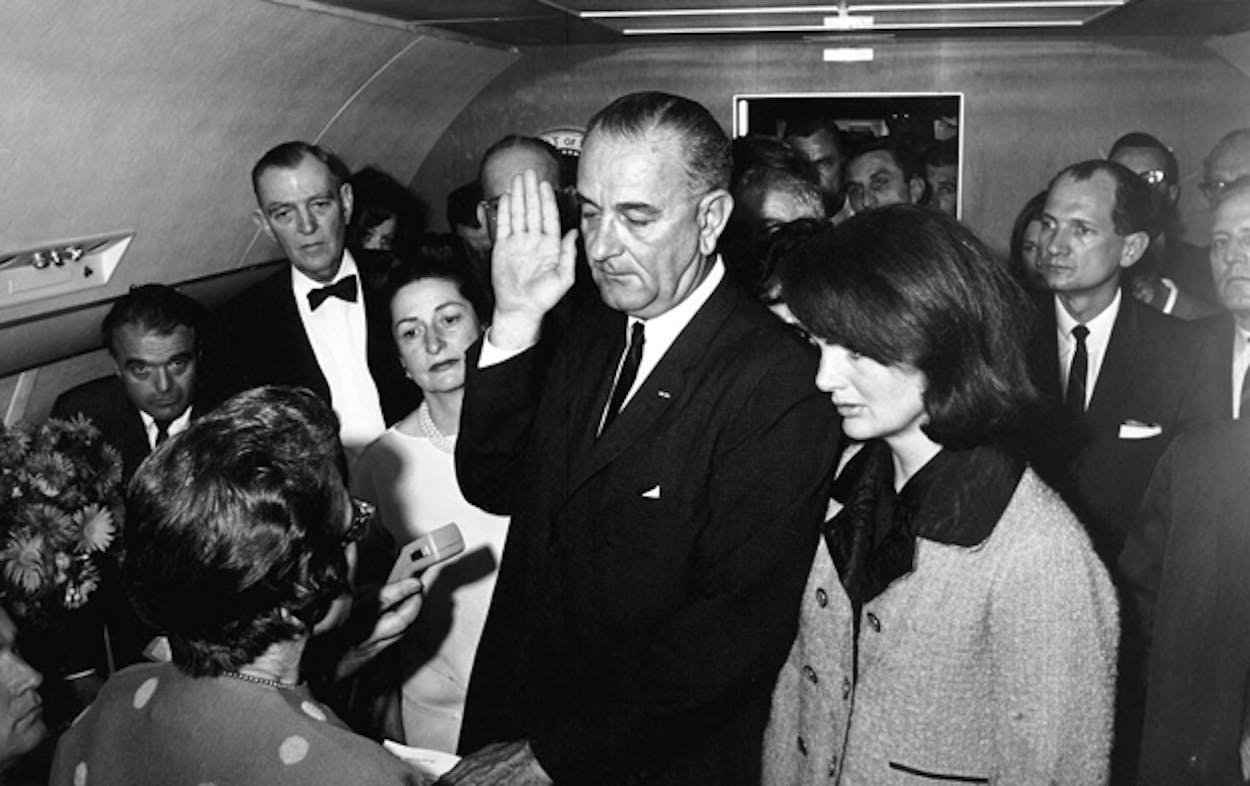Robert Caro, who published his first volume on Lyndon Baines Johnson in 1982, shares an excerpt from his new book on the 36th president in the latest issue of the New Yorker. The 16,000-word piece, which retells the JFK assassination in meticulous detail, is taken from The Passage of Power, Caro’s fourth and penultimate book about LBJ, which will be released on May 1.
The story (subscription only, for now) is replete with the dramatic tension Caro is known for: he describes how, as the presidential motorcade rolled toward Dealey Plaza, reporters in Washington were digging deeper into Johnson’s personal wealth and radio empire, and senators were meeting to discuss a brewing scandal involving Johnson aide Bobby Baker.
The cheering crowds in downtown Dallas, which roared to greet Kennedy’s car, hushed by the time Johnson’s rented gray convertible reached them. This, Caro says, was emblematic of where LBJ was in his life: the once-powerful Senate majority leader now despairing as he languished in the shadow of a handsome young president. As Caro writes,
Trailing them in the rented car, driving between crowds of people cheering but not for him, sharing a seat with a man who had humiliated him, Lyndon Johnson was far enough behind the Presidential limousine that the cheering for the Kennedys and the Connallys—for John Connally, some of it, for his onetime assistant, who had become his rival in Texas—was dying down by the time his car passed, and most of the faces in the crowd were still turned to follow the Presidential car as it drove away from them. So that, as Lyndon Johnson’s car made its slow way down the canyon, what lay ahead of him in that motorcade could, in a way, have been seen by someone observing his life as a foretaste of what might lie ahead if he remained Vice-President: five years of trailing behind another man, humiliated, almost ignored, and powerless. The Vice-Presidency, “filled with trips … chauffeurs, men saluting, people clapping … in the end it is nothing,” as he later put it.
Over the past three years, this feeling had taken a physical toll on him that could be seen in the lines of his face, “the slump of his shoulders,” and “his gait, the slow steps that had replaced the old long Texas stride.”
But then, everything changed. After the motorcade turned onto Elm Street, the rifle shots rang out. With the noise, Secret Service agent Rufus Youngblood began screaming at Johnson to “get down” before flinging himself over the lanky Texan. LBJ said he would never forget Youngblood’s “knees in my back and his elbows in my back.” The car began to move “faster and faster,” ferrying the couple to Parkland Hospital, where they were hurried into an empty exam room. At 1:20 p.m., 50 minutes after the shooting, White House staffer Ken O’Donnell told LBJ, “He’s gone.”
The Vice President was remarkably calm as he worked out the next step. He put on his “deciding expression,” which Caro describes as “the big jaw jutting, the lips above it pulled into a tight, grim line, the corners turned down in a hint of a snarl, the dark-brown eyes, under the long black eyebrows, narrowed, hard, piercing.” But underlying that calm was a haunted feeling Johnson would never shake:
Even in this first hour after John F. Kennedy’s death, Lyndon Johnson seems to have had feelings that would torment him for the rest of his life—feelings understandable in any man placed in the Presidency not through an election but through an assassin’s bullet, and feelings exacerbated, in his case, by the contrast, and what he felt was the world’s view of the contrast, between him and the President he was replacing; by the contempt in which he had been held by the people around the President; and by the stark geographical fact of where the act elevating him to office had taken place.
Johnson decided to be sworn in aboard Air Force One, rather than waiting to return to Washington, and he placed a call to the dead president’s brother, Attorney General Robert Kennedy, for instructions. And, aware that “[n]o single gesture would do more to legitimatize the transition in the eyes of the world … than the attendance at his swearing-in ceremony of the late President’s widow,” Johnson waited on Jackie Kennedy’s presence.
Those present on the plane have noted that Johnson began to resemble his former self. Ultimately, his quick and authoritative decision-making helped bring an end to the chaos of the day: “Now he had suddenly come to the very pinnacle of power. However he had got there, whatever concatenation of circumstance and tragedy—whatever fate—had put him there, he was there, and he knew what to do there,” Caro wrote. The question was, what would he do next?







